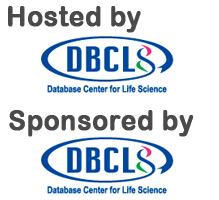Keynote Speakers
KEGG molecular networks for linking genomes to society
[Abstract]The KEGG database that we have been developing since 1995 contains, among others, accumulated knowledge on metabolism, other cellular processes, organismal systems, human diseases and drugs represented as networks of molecular interactions, reactions and relations. The KEGG molecular networks, including KEGG pathway maps (graphs), BRITE functional hierarchies (ontologies) and KEGG modules (logical expressions), are widely used as a reference knowledge base for integration and interpretation of genome sequences and other types of data. In recent years the KEGG molecular networks have been expanded in two ways. One is linking genomes to phenotypes. The KEGG modules are being improved to automate interpretation of phenotypes, such as metabolic capacity and pathogenicity, from genome and metagenome sequences. The other is linking genomes to society. The KEGG MEDICUS translational bioinformatics resource has been developed by integrating drug labels (package inserts) used in society. The entire set of drug labels in Japan has also been processed to extract drug interactions associated with contraindications and precautions, as well as pharmaceutical additive and pharmacogenomic biomarkers. KEGG MEDICUS is directly targeted to society for helping to understand the scientific basis of diseases and drugs of personal interest.
[Speaker's Bio]
Minoru Kanehisa, the founder of KEGG, is Professor of Institute for Chemical Research at Kyoto University, Technical Director of Pathway Solutions Inc., and President of NPO Bioinformatics Japan. After receiving D.Sc. in physics from the University of Tokyo in 1976, he worked in the Johns Hopkins University School of Medicine, the Los Alamos National Laboratory where he was one of the cofounders of GenBank, and the National Cancer Institute of the National Institutes of Health. Since 1985 he is at Kyoto University and was also Professor of the Human Genome Center, Institute of Medical Science, University of Tokyo (1991-1995 and 2002-2012). Other activities include: concurrent professorship in Kyoto University Graduate Schools of Biological Sciences (1987-2012) and Pharmaceutical Sciences (2003-2012), visiting professorship in National Institute for Basic Biology in Okazaki (1999-2001), Institute for Advanced Biosciences of Keio University (2001-2003), and the Boston University Bioinformatics Program (2005-present), president of the Japanese Society for Bioinformatics (1999-2003), principal nvestigator of the KEGG database project (1995-present), and many more.
It’s all semantics for the user
[Abstract]The Semantic Systems Biology group at the Norwegian University of Science and Technology is active in the field of biological knowledge management. The group has developed the BioGateway platform: a tool and resource set designed to provide the intended end-user, ideally a biologist or biomedical researcher, with assistance in the interpretation of her experimental data. The BioGateway platform is fueled by a data semantification pipeline that covers a chain of ontology manipulation, knowledge integration, pre-computing and reasoning, and data visualization. At various points along this pipeline we are active in making improvements with regard to performance, to keep the process tractable. Recently we published the orthAgogue software, boosting the speed of orthology prediction 200 fold. Even more recently, we ventured into a new approach to increase the speed of reasoning in order to eliminate a significant bottleneck in the generation of relational closures.
End users should, however, not be concerned with the details of this process, for all they care the technology can remain ‘under the hood’. What they do care about is an intuitive use of semantic resources and it is there that current interfaces for the design of SPARQL queries or inspection of the results leave a lot to be desired. Although for a query interface we have no improvements in preparation, for the visualization of ontologies we have produced the OLSVis software, an intuitive and flexible viewer that is able to display complex ontologies.
Download the whole abstract
[Speaker's Bio]
Martin Kuiper received a M.Sc. degree in Molecular Biology and Biochemistry (1982), and a PhD degree (1987) in Biology, at the University of Groningen, Netherlands. A nomadic post-doctoral existence allowed him to visit virtually all of the Kingdoms of Nature. In 1992 he took a career change and went to industry, where he worked at KeyGene NV, the Netherlands; GenScope bvba / Celera West, Belgium / California; and Aventis CropScience, Belgium. In 2001 he returned to academia to develop systems biology approaches at the Flanders Institute of Biotechnology in Belgium. In 2008 moved to Norway where he started a systems biology group at the Department of Biology at NTNU, Trondheim, to promote the incorporation of systems biology and semantic web concepts in the life sciences at NTNU. His research interests include the development of approaches and tools for the analysis of biological data, not only by bioinformaticians but also by the biologists themselves. His current group focuses on the use of ontologies and semantic web technologies for the integration and exploration of biological knowledge.
Biology website:
http://www.ntnu.edu/biology/semantic-systems-biology
NT Faculty website:
http://www.ntnu.edu/nt/research/systemsbiology
Project website:
http://www.semantic-systems-biology.org
Strategies for structuring free text to enable drug discovery and development
[Abstract]Therapeutic research creates scenarios that differ from academic research due to the constraints of linking targets, drugs and diseases for the sole purpose of treating patients. Pharmaceutical industry scientists routinely triage new drug target candidates, therapeutic modalities, and new indications for existing drugs. To do so effectively requires tapping into all available prior knowledge, be it public, subscription based, or internal to a specific organization. Prior knowledge represents the spectrum of findings derived from journal articles, patents or internal reports. The original free text represents one end of the spectrum from which entities and events are automatically extracted or manually curated. These derived statements increase in value when they are normalized to unique identifiers and codified in a machine-readable language. Accurate translation of free text into normalized, machine-readable complex statements is expensive, and we employ numerous strategies to meet the needs of biologists, chemists and clinicians looking for therapeutic opportunities. Investments range from licensing curated content and funding curation to hosting text mining systems, thereby ensuring comprehensive coverage and rapid turnaround.
[Speaker's Bio]
Dr. Phoebe Roberts is a recognized leader in applying sophisticated search technologies to challenging problems in drug development. She is currently an Associate Research Fellow at Pfizer, overseeing the design and administration of multiple text mining systems, where output is used to enable computational analysis of real-world big data problems. Prior to joining Pfizer, she helped launch text mining at Biogen Idec (profiled in BioIT World, 2006). Dr. Roberts obtained her PhD in Molecular Biology from the University of Chicago, and performed post-doctoral research at University of Pennsylvania, studying post-translational regulatory cascades in model organisms. Her interest in text mining arose from analyzing hits from high-throughput experiments, where tens to hundreds of genes were coming out of genetic screens and the literature was the main means of validating and prioritizing hits. As steering committee member for the TREC Genomics Track, she helped design the challenge tasks, and oversaw the relevance judging process, from writing guidelines and tool specifications to training curators and analyzing their data. Currently, she is a member of the BioCreative Interactive Task User Advisory Group, where she helps design tasks and oversees challenge participants. She has authored numerous articles on text mining for systems biology, molecular perturbation event extraction, and assisted curation using text mining tools. In a world with too much information, Dr. Robert's mission is to enable epiphanies for her scientific research clientele with the use of automated text mining tools.
[Obituary]
Dr. Phoebe Martha (Robertson) Roberts, an Associate Research Fellow at Pfizer who was an avid athlete and world traveler, died unexpectedly on Sunday, December 8 near her home in Beverly, MA. She was 47.
Phoebe was born on July 25, 1966 in Urbana, IL, to Jane (Ingersoll) Robertson and Dr. James E. Robertson, a Professor of Computer Engineering at the University of Illinois at Urbana-Champaign. She moved to Ann Arbor, Michigan in 1968 and lived there until she graduated from Ann Arbor’s Pioneer High School in 1984. She graduated from Miami University in Ohio with a BA in Biology in 1988. After several years of research at Toronto’s ”Sick Kids” hospital, Phoebe attended graduate school at the University of Chicago and received a PhD in Molecular Biology in 1997, publishing research on the degradation of intracellular proteins. She performed postdoctoral research at the University of Pennsylvania.
She began her professional career at Proteome, Inc, a small biotech startup in Beverly, MA in 2000. She then joined Biogen and later, Pfizer, where she helped nurture the emerging field of biomedical text-mining. Phoebe’s pioneering use of automated text mining tools gave researchers the ability to better understand the medical and scientific implications of the academic literature. By compiling and organizing the literature, Phoebe’s work allowed researchers to avoid repeating earlier work and focus on the most promising future directions. Phoebe used to sum up her work by telling researchers that ”a week in the lab will save you an afternoon in the library.”
In addition to her passion for science, Phoebe was a remarkable athlete with diverse skills and interests. She biked, skied, hiked, kayaked and ran with the enthusiasm and prowess of someone half her age. Among her most notable athletic achievements was the completion of the 750-mile Boston-Montréal-Boston bike event in 2001, along with multiple full marathons. Her latest vacation involved a 7-day mountain bike trip from Telluride, CO to Moab, UT. She tailored her daily commute to include an eleven-mile ride on her folding bicycle. During the winter, she spent available weekends skiing at Killington, VT.
Phoebe loved to travel and visited many interesting places across the globe in her short life. This week, in fact, she had scheduled a trip to Japan to deliver a keynote speech at the Languages in Biology and Medicine Symposium in Tokyo. In the summer months, when not traveling, she enjoyed the natural beauty of the water, warm sands, and camaraderie found at Beverly Farm’s West Beach.
Phoebe was a member of North Shore Cyclists and served on the Beverly Farms/Pride’s Crossing Fourth of July Committee. Phoebe is survived by her husband of nine years, Frank Roberts, of Beverly, MA; her brother David Robertson of Philadelphia, PA, his wife Anne Standley, and nephew and niece Gordon and Caroline; brother Alan Robertson of Ann Arbor, MI; and sister Alice Dunn of Florence, KY.
In lieu of flowers, the family requests that a donation be made in her honor to Smile Train (www.smiletrain.org), a charity devoted to the repair of cleft palate defects in children or to the Make-A-Wish Foundation (wish.org).
Phoebe’s untimely death is an immeasurable loss not only for her family but also for her countless friends and colleagues from across the country and around the world. She will be sorely missed.
Visiting hours will be at the Campbell - Lee, Moody, Russell Funeral Home, 525 Cabot Street, North Beverly on Thursday, December 12, 2013 from 5 - 8pm. A Funeral Service will be held at St. John’s Episcopal Church, 705 Hale St., Beverly Farms, Saturday at 1:00pm. Relatives and friends are invited to attend. Burial will be in the Central Cemetery, Beverly. Information, directions, condolences at www.campbellfuneral.com




